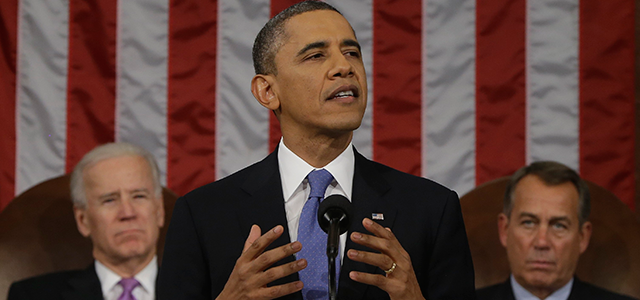
President Obama and other administration officials have been road-testing several possible themes and proposals that are likely to come up in his State of the Union speech on Tuesday, with all indications being that he will concentrate on domestic issues. While there will be plenty of partisan debate over the speech’s content, we thought it would be informative to look at what Americans think about topics that Obama is likely to discuss.
11Economy: Americans still have mostly bleak views of the national economy, according to a new Pew Research Center survey. 45% rated economic conditions “only fair” and 39% “poor,” compared with 16% who termed them excellent or good. For more information, see our key data points.
22Health care reform: More than half (54%) of Americans disapprove of Obama’s signature health care reform law, the Affordable Care Act, according to a Pew Research survey from December; 41% said they approved of the law. Nearly half (48%) said the law would make the nation’s health care situation worse in the long run, 35% said it would make it better, and 12% said it wouldn’t make much difference either way.
33Income inequality: 65% of Americans say the gap between the rich and everyone else has widened in the past decade, according to a new Pew Research Center survey; a similar percentage (67%) recently told Gallup they were dissatisfied with the way income and wealth are distributed in the U.S. In the Pew Research survey, nearly seven-in-ten Americans said the government should do “a lot” (43%) or “some” (26%) to reduce the gap. For more on inequality (especially the impact on the middle class), see these key data points.
44Minimum wage: 73% support raising the federal minimum wage from $7.25 to $10.10 an hour, according to Pew Research; 40% say they “strongly favor” such an increase.
55Unemployment benefits: 63% support a one-year extension of federal unemployment benefits for the long-term unemployed, the Pew Research Center reports.
66College affordability: About three-quarters (77%) of respondents in a September 2013 Washington Post-Miller Center poll said it’s become harder for people like them to pay for college. In a November Allstate/National Journal poll, only 45% of Americans said paying for a college education would be “very” or “somewhat” realistic given their current financial situation; 47% said it would be “not very” or “not at all” realistic.
77Immigration: Seven-in-ten Americans (71%) support a path to legalization for undocumented immigrants, our survey from June 2013 found, and 77% say any legislation establishing such a process also should increase border security. But the public is divided on whether people in the country illegally should be allowed to pursue legal status while border improvements are being made (49%) or only after effective border control is established (43%). We further explore Americans’ complex feelings about immigration in our key data points.
88NSA surveillance: 53% of Americans disapprove of the government’s collection of telephone and internet data as part of its anti-terrorism efforts, according to our January survey. Half of Americans say they’ve not heard anything about Obama’s proposed changes to the surveillance program; of those who have heard of the changes, few think they’ll have much effect on either protecting privacy or fighting terrorism.
99Climate change: Two-thirds (67%) of Americans say there’s solid evidence that the earth has been getting warmer over the last few decades, our survey last October found, and most of those (or 44% of the public) say that’s mostly because of human activity. But Americans don’t see climate change as an especially urgent problem: Just 29% of people in a new Pew Research survey said “dealing with global warming” should be a top priority for Obama and Congress this year. For more on the climate of opinion and opinions on climate, see our key data points.
1010Foreign policy: Americans don’t care — 78% say it’s more important for Obama to focus on domestic policy, versus just 9% who say the president should turn his attention to foreign policy. If you’re among that 9%, you might want to check out our key data points.



